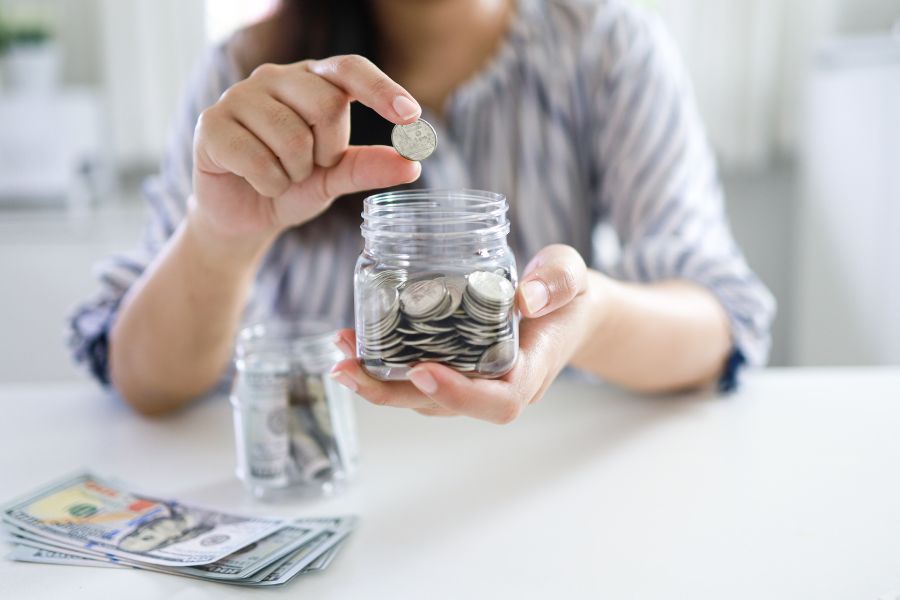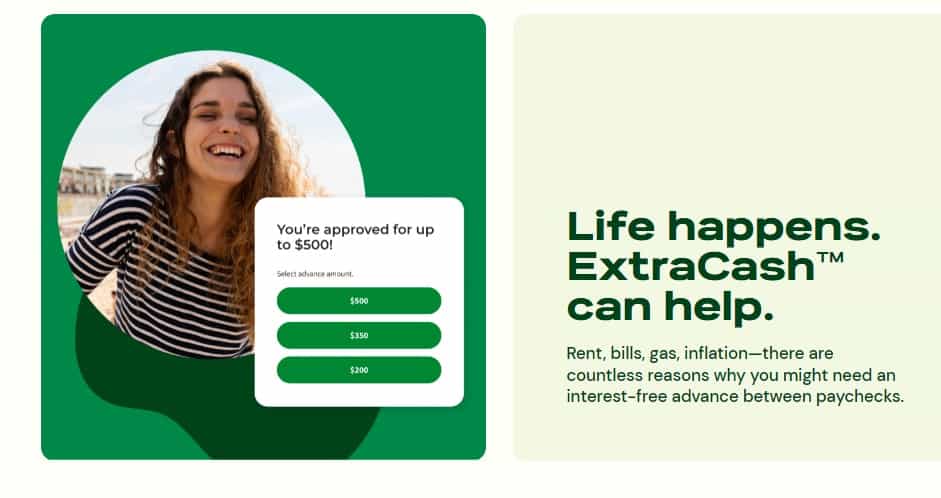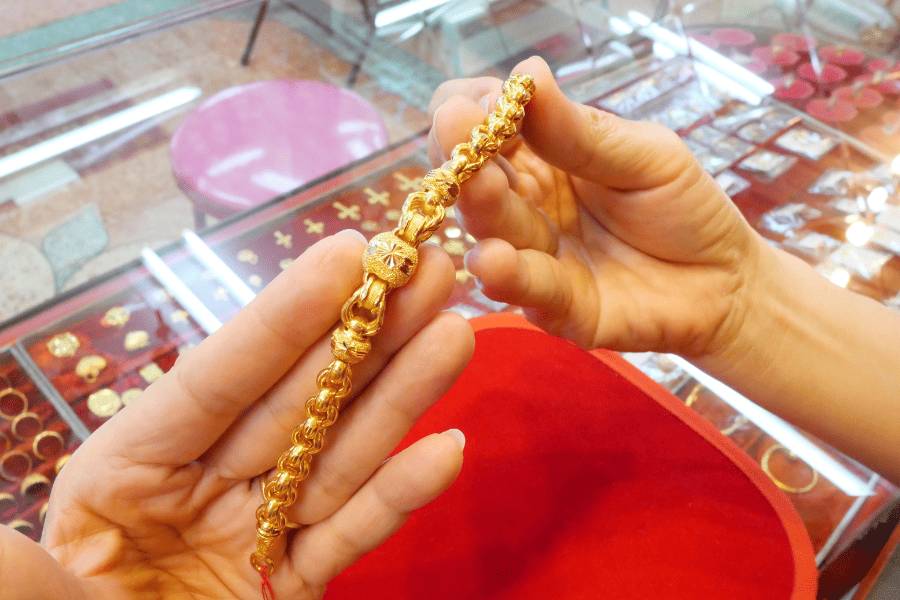Last Updated on September 9, 2023 by Rebecca Lake
When you need quick cash, you might consider taking a valuable item or two to your local pawn shop. Pawn shops can be a great way to get money fast, but is it better to pawn or sell your items?
Getting a pawn loan is better if you need instant cash and you want the option to get your collateral back. On the other hand, selling to a pawn shop can be an attractive option if you want to get the most money for your items and you don’t plan to keep them.
Getting money from a pawn shop is a relatively easy process, which is a plus if you need cash for a financial emergency. But is it better to pawn or sell?
We’ll help you decide.

LIKE FREE MONEY?
Here are some of my go-to apps for earning extra cash!
Survey Junkie. Earn up to $50 per survey just for sharing your opinions.
Swagbucks. Make money by playing games and watching videos. Join for free and get a $10 bonus when you sign up!
InboxDollars. Take surveys and get paid, no special skills or experience required!
Rakuten. Earn up to 40% cash back at hundreds of retailers, online or in stores. And get $30 for each person you refer, along with a $10 sign up bonus!
CashApp. Need a simple app for sending and receiving money? Get $5 free when you use code ‘VZXRXZN’ to join CashApp.
Table of Contents
What Is a Pawn Shop?

A pawn shop is a business that offers short-term loans and cash for high-value items. You might also hear the terms ‘pawn store’, ‘pawn broker’, or ‘buy-sell-trade store’ used to describe pawn shops.
The pawn industry is estimated at $4 billion in the U.S. and millions of people rely on pawn shops for loans when they need access to quick cash. Chances are, you can find at least one pawn shop near you, even if you live in a small town.
Pawn shops exist as an alternative to traditional financial institutions for people who need to borrow money but don’t have a good credit history.
With a traditional bank loan, a credit check is usually required and you’ll need a good credit score to qualify. A pawn shop, on the other hand, can give you a short-term loan with no credit check required.

Need Loan Funding Fast?
Get a personal loan from Upstart
Upstart offers unsecured personal loans ranging from $1,000 to $50,000. Get cash to consolidate dates, pay off medical bills, or cover emergency expenses. There are no hidden fees and you can get funds as quickly as the next day after you’re approved.
How Pawning Items Works
Pawning works by allowing you to use an item of value as collateral for a short-term loan, also called a collateral loan.
You take your items to a local pawn shop and the pawn shop will appraise them. The current market value of the item, in part, determines the loan amount.
The pawn shop owner will make a loan offer, based on the value of your item. If you accept the pawn shop’s offer, you can leave with cash in hand in a matter of minutes.
You’ll get a pawn ticket and the pawn broker should tell you when the redemption period ends. A typical time period for a pawn loan is around 30 days but pawn lenders may offer shorter or longer terms.
In the meantime, the pawn store holds onto your valuable item. At the end of the loan term, you can get your collateral back by repaying your pawn loan, along with any interest or fees the pawn broker charges. You’ll just need to present your pawn ticket to reclaim your personal property.
Pros and cons of pawn shop loans
Pawning items can give you immediate access to quick money. And with the right pawn shop, it can end up being a positive experience.
Here are some of the primary advantages of pawn loans:
- Get access to cash fast. Pawn loans are one of the best ways to get money quickly. If you don’t have an emergency fund, you might seek short term loans from pawn shops to cover the gap.
- Good credit isn’t required. Got bad credit? That doesn’t really matter for a pawn shop loan. If you’ve been turned down for loans by traditional banks, then a pawn shop might be one of the first places you could look for quick funding.
- Almost anything can qualify as collateral. Pawn brokers can accept all kinds of things as collateral for a pawn loan. An item of greater value can help you get a bigger loan but you don’t need to be sitting on a pile of luxury items to pawn your stuff for cash.
Check your credit scores for free with Credit Sesame. Credit Sesame offers credit monitoring services, along with prescreened credit offers, and tips for improving your scores. It’s free to sign up, with no credit card required!
Now, are pawn loans always the best option? No, and it’s essential to understand the disadvantages and risks.
- Loan value may not align with actual value. Pawn lenders can use an item’s market value as a guide for determining how much money to lend, but their idea of a fair price might differ greatly from yours. You can try haggling or bargaining to try and get a higher price for your items but they’re not obligated to offer the best prices.
- It’s a short-term solution at best. If you’re taking out a pawn loan to get caught on late payments to bills or cover a relatively minor expense that you just don’t have cash for, that could indicate a bigger issue. While pawn loans can put money in your hands fast, taking them out frequently might be a sign that you need to take a closer look at your financial habits.
- Failure to pay puts your collateral at risk. Pawnshop owners make loans by banking on the person not coming back to get their stuff before the redemption period ends. That’s how the pawn business model works. If a borrower doesn’t claim their item before the loan period ends, the pawnbroker can keep it and resell it to someone else for financial gain.
That last point is especially important to know if you’re planning to pawn items that have sentimental value or an irreplaceable family heirloom. Sure, you could get some fast cash but the family member who left the item to you might not appreciate you losing it to a pawn store.
How to get a pawn shop loan
If you want to pawn items of value, the first step is finding a pawn shop near you. That’s pretty easy to do with a simple Google search.
Click the button below to see pawn shop locations in your area. Results will open in a new tab.
Before you take your items to the pawn shop, you might want to research their value first. That way, you have an idea of what your stuff is worth so you can negotiate the best possible price.
Next, you’ll take your items to a local pawn store. Again, the pawn broker will look at what you’ve got and make a loan offer, based on the total value.
If you agree to the loan terms, you’ll have to sign off on some paperwork and hand over your collateral. Once you’ve done that, you can get the cash for the loan.
When you’re signing off on a pawn loan, remember to look at the fine print. Specifically, be sure you understand:
- Your time frame for repaying the loan
- The annual percentage rate (APR) and interest rate you’ll pay
- Any fees the pawnbroker charges
State law regulates the maximum interest rate and fees a pawn shop can charge for a loan, including title loans. Shopping around to compare different pawn loans can help you get the best terms.
How Selling Items to a Pawn Shop Works
Pawn loans can give you access to fast cash when you need it. And if you have high value unwanted items, you could also sell them to a pawn shop outright.
Watching an episode of “Pawn Stars” can give you a good idea of how both sides of pawning work. On the show, customers bring in everything from diamond jewelry to elephant poop.
Rick (or a member of his team) looks over the item(s) and then asks the owner whether they want to pawn or sell. He then makes them an offer, at which point they either accept, decline, or do a little haggling to try and get the best deal.
If you want to sell an item to a pawn shop, you’d take it to a local pawn store and ask them to make an offer. If you like the price you’re quoted, you give them the item(s) and the pawn shop gives you cash.
You’re not agreeing to a loan and there’s nothing to repay.
Pros and cons of selling items to a pawn shop
Selling things outright to a pawn shop could be the better option if you’re not concerned about keeping the items in question.
Here are the main advantages of selling items to a pawn shop.
- No interest charges. Since you’re not getting a loan, you don’t have to worry about paying any interest or fees to the pawn shop. And you’re not creating any debt either.
- Clear out clutter. Pawn shops can buy all kinds of things for cash. It could be a good place to unload stuff that you no longer want or need and make a little extra money on the side at the same time.
- High demand items can net a lot of cash. The more in-demand something is, the more money you’re likely to get for it. And selling to a pawn shop might be easier than trying to list things for sale on eBay, Craigslist, or Facebook Marketplace.
Then again, selling doesn’t always make sense and there’s one big reason why. You might be able to get better prices for your stuff elsewhere.
Say you have unwanted jewelry, for example, including a diamond engagement ring, two luxury watches, and some scrap gold. You might be able to get a better price for your items at a jewelry store instead.
Is It Better to Pawn or Sell?
Whether it’s better to pawn or sell can depend on several things, including:
- How much cash you need
- How quickly you need it
- Whether you want to keep your collateral or not
For example, if you have gold jewelry that you no longer wear, selling it could make sense if you’re able to get a good price.
Items that are made of pure gold can bring in the most money when gold prices are up. Since the price of gold fluctuates, you have to get the timing right in order to make the most money.
Now, what if you don’t want to part with your jewelry but you’re desperate for cash?
In that case, a pawn loan could be a good option, assuming that you’re not able to explore other borrowing options.


Need a short-term loan with no fees?
Dave can put up to $500 in your bank account in minutes!
If you’re short on cash and need money to pay bills or cover expenses, the Dave app can help. With the ExtraCash feature, you can get up to $500 with no credit check, no interest, and no fees! You’ll just need to download the Dave app and link it to your bank account to get started.
How to Get the Most Money at a Pawn Shop
To get the most money at a pawn shop, you’ll want to spend some time doing a little research first.
You can start by trying to get an estimate of what your item is worth. How you do that can depend on what the item is.
For example, if you’ve got a piece of jewellery to pawn or sell, you might use one of these websites to get an instant appraisal online:
If you’re trying to get a title pawn loan on a car you own, then you might use Kelley Blue Book as a resource for estimating its value.
For things like collectibles, musical instruments, or video game consoles you might need to visit a specialty store to get a quote.
So, say you’re trying to pawn a PS5, for example. You might take it to GameStop and ask them how much they would offer for it. Or if you’re trying to pawn a guitar, you might take it to a local music store and see what they’re offering for similar items.
Next, you’ll want to clean your item up and make sure it’s in the best condition possible. That could help you squeeze a little more value out of it when you’re ready to pawn or sell it.
Once your item is prepped, you can visit a pawn store near you.
Best Things to Sell at a Pawn Shop


As mentioned, you can pawn or sell a wide variety of things to a pawn shop. But if you’re interested in what gets the most money, here are some of the best things to sell at a pawn shop.
- Musical instruments, including guitars and drum sets
- Fine jewelry
- Rare coins
- Luxury watches
- Comic books
- Action figures and other collectibles
- Designer handbags or shoes
- Power tools
- Cameras
- Laptops and tablets
- Sports equipment and gear
- ATVs, including four-wheelers and dirtbikes
- Gaming consoles and video games
- Smartphones
- Antiques
Keep in mind that there are some things pawn shops won’t buy. The list typically includes counterfeit items, contraband items, anything that’s considered to be hazardous, and items that are broken. Some pawn dealers won’t buy guns or other firearms either unless they’re considered to be antiques.
Is It Better to Pawn or Sell FAQs
Do you get more money if you pawn or sell an item?
Whether you get more money for pawning or selling an item can depend on what the item is, what it’s worth, and how in demand it is. Most of the time, you’re better off selling versus pawning, though if you want to be able to keep your items, a pawn loan can let you do that.
Is it better to pawn or sell jewelry?
Pawning jewelry could be a good option if you need cash for the short term and you can pay off a pawn loan in the required time frame. On the other hand, you might get more money for your items by selling them to a local jewelry store or a business that specializes in buying jewelry and precious metals. Cash for Gold USA, for example, has earned a reputation for offering some of the highest payouts for unwanted jewelry.
Is it better to pawn or sell a vehicle?
It might be better to sell a vehicle if you no longer need it and you want to get as much money as possible for it. Selling cars, trucks, and other vehicles to a private owner may yield a higher purchase price versus using your vehicle as collateral for a title loan. On the other hand, you might decide to pawn your vehicle temporarily if you only need cash for a short amount of time and you’re certain you can pay it back. In that case, you might look for a title pawn lender near you.
Is it better to pawn or sell a TV?
If you have a TV or other electronics you want to unload, selling could get you more money than pawning if your items are newer and in good condition. It could make sense to pawn your TV (or laptop or tablet) if you need to be able to use it again and can pay back your pawn loan.
What are some alternatives to pawn shop loans?
There are lots of alternatives to pawn shop loans that you can use to get money fairly quickly. Some of the options include:
- Using a credit card to cover expenses
- Exploring personal loans from online banks, which can include bad credit loans
- Getting a loan from a friend or family member
- Using a finance app like Dave to borrow up to $500
- Asking your employer for an advance against your paycheck
Are these perfect solutions? Not exactly, as they each have their pros and cons. But it’s worth looking at every possibility when you need to borrow money.
How much money can you get from a pawn shop?
As a general rule of thumb, pawn shops usually offer anywhere from 25% to 60% of the item’s resale value. So if you’re pawning a piece of jewelry that’s worth $1,000 for resale, you could expect to get anywhere from $250 to $600 for it. That type of payout structure is what allows pawn brokers to make a profit when reselling items that people have sold to them or pawned and forfeited because they didn’t repay their loan.
What is the best pawn shop?
The best pawn shop is the one that’s willing to offer you the most money to pawn or sell your items. Researching different pawn shops near you, as well as online pawn shops, can help you find one that’s going to pay you the highest prices for your valuables. A good pawn shop is also transparent when it comes to outlining loan terms, has good customer service, and doesn’t engage in shady business practices.



Need Loan Funding Fast?
Get a personal loan from Upstart
Upstart offers unsecured personal loans ranging from $1,000 to $50,000. Get cash to consolidate dates, pay off medical bills, or cover emergency expenses. There are no hidden fees and you can get funds as quickly as the next day after you’re approved.
Final Thoughts
Is it better to pawn or sell? There’s no single answer, as everyone’s financial situation and needs are different. Understanding the difference between pawning vs. selling–and what alternatives you have–can help you choose the best option for getting cash quickly when you’re desperate.
Need more money tips? Read these posts next:
- Coinstar Near Me: Best Places to Turn Coins Into Cash
- Gift Card Exchange Kiosk Near Me Avoid the Fee
- Sell Gift Cards Instantly Online [Get Instant Cash for Gift Cards]
- 50+ Things to Sell to Make Money (Sell Stuff for Cash Fast!)
- Sell Kids Clothes Near Me: Where to Sell Kids Clothes for Cash Fast!
